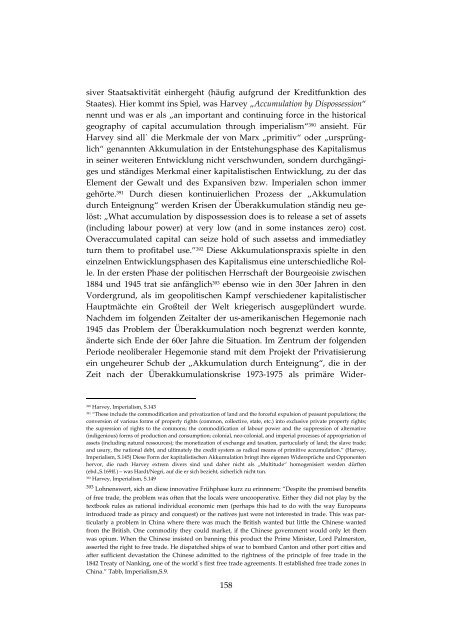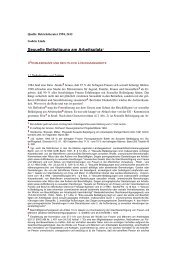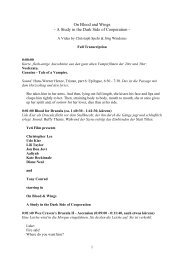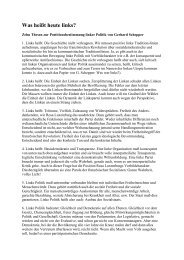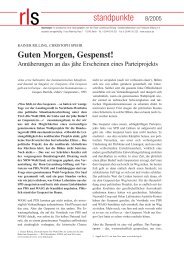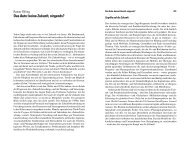outbreak. let's take over. american empire als wille ... - Rainer Rilling
outbreak. let's take over. american empire als wille ... - Rainer Rilling
outbreak. let's take over. american empire als wille ... - Rainer Rilling
Erfolgreiche ePaper selbst erstellen
Machen Sie aus Ihren PDF Publikationen ein blätterbares Flipbook mit unserer einzigartigen Google optimierten e-Paper Software.
siver Staatsaktivität einhergeht (häufig aufgrund der Kreditfunktion des<br />
Staates). Hier kommt ins Spiel, was Harvey „Accumulation by Dispossession“<br />
nennt und was er <strong>als</strong> „an important and continuing force in the historical<br />
geography of capital accumulation through imperialism“ 390 ansieht. Für<br />
Harvey sind all` die Merkmale der von Marx „primitiv“ oder „ursprünglich“<br />
genannten Akkumulation in der Entstehungsphase des Kapitalismus<br />
in seiner weiteren Entwicklung nicht verschwunden, sondern durchgängiges<br />
und ständiges Merkmal einer kapitalistischen Entwicklung, zu der das<br />
Element der Gewalt und des Expansiven bzw. Imperialen schon immer<br />
gehörte. 391 Durch diesen kontinuierlichen Prozess der „Akkumulation<br />
durch Enteignung“ werden Krisen der Überakkumulation ständig neu gelöst:<br />
„What accumulation by dispossession does is to release a set of assets<br />
(including labour power) at very low (and in some instances zero) cost.<br />
Overaccumulated capital can seize hold of such assetss and immediatley<br />
turn them to profitabel use.” 392 Diese Akkumulationspraxis spielte in den<br />
einzelnen Entwicklungsphasen des Kapitalismus eine unterschiedliche Rolle.<br />
In der ersten Phase der politischen Herrschaft der Bourgeoisie zwischen<br />
1884 und 1945 trat sie anfänglich 393 ebenso wie in den 30er Jahren in den<br />
Vordergrund, <strong>als</strong> im geopolitischen Kampf verschiedener kapitalistischer<br />
Hauptmächte ein Großteil der Welt kriegerisch ausgeplündert wurde.<br />
Nachdem im folgenden Zeitalter der us-amerikanischen Hegemonie nach<br />
1945 das Problem der Überakkumulation noch begrenzt werden konnte,<br />
änderte sich Ende der 60er Jahre die Situation. Im Zentrum der folgenden<br />
Periode neoliberaler Hegemonie stand mit dem Projekt der Privatisierung<br />
ein ungeheurer Schub der „Akkumulation durch Enteignung“, die in der<br />
Zeit nach der Überakkumulationskrise 1973-1975 <strong>als</strong> primäre Wider-<br />
390<br />
Harvey, Imperialism, S.143<br />
391<br />
“These include the commodification and privatization of land and the forceful expulsion of peasant populations; the<br />
conversion of various forms of property rights (common, collective, state, etc.) into exclusive private property rights;<br />
the supression of rights to the commons; the commodification of labour power and the suppression of alternative<br />
(indigenious) forms of production and consumption; colonial, neo-colonial, and imperial processes of appropriation of<br />
assets (including natural ressources); the monetization of exchange and taxation, partucularly of land; the slave trade;<br />
and usury, the national debt, and ultimately the credit system as radical means of primitive accumulation.” (Harvey,<br />
Imperialism, S.145) Diese Form der kapitalistischen Akkumulation bringt ihre eigenen Widersprüche und Opponenten<br />
hervor, die nach Harvey extrem divers sind und daher nicht <strong>als</strong> „Multitude“ homogenisiert werden dürften<br />
(ebd.,S.169ff.) – was Hardt/Negri, auf die er sich bezieht, sicherlich nicht tun.<br />
392<br />
Harvey, Imperialism, S.149<br />
393 Lohnenswert, sich an diese innovative Frühphase kurz zu erinnnern: “Despite the promised benefits<br />
of free trade, the problem was often that the loc<strong>als</strong> were uncooperative. Either they did not play by the<br />
textbook rules as rational individual economic men (perhaps this had to do with the way Europeans<br />
introduced trade as piracy and conquest) or the natives just were not interested in trade. This was particularly<br />
a problem in China where there was much the British wanted but little the Chinese wanted<br />
from the British. One commodity they could market, if the Chinese g<strong>over</strong>nment would only let them<br />
was opium. When the Chinese insisted on banning this product the Prime Minister, Lord Palmerston,<br />
asserted the right to free trade. He dispatched ships of war to bombard Canton and other port cities and<br />
after sufficient devastation the Chinese admitted to the rightness of the principle of free trade in the<br />
1842 Treaty of Nanking, one of the world`s first free trade agreements. It established free trade zones in<br />
China.” Tabb, Imperialism,S.9.<br />
158


